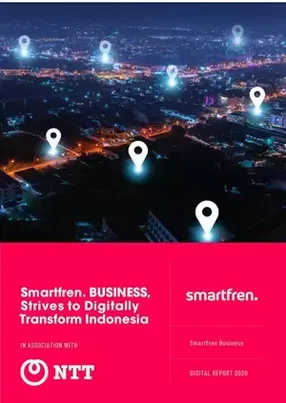Smartfren. BUSINESS strives to digitally transform Indonesia
Starting his career in the technology and telecommunications industry in 1991 at HCL Ltd. in India, Puneet Garg brought 27 years of experience in the industry with him when joining Smartfren. BUSINESS in 2019 as the company’s CTO Enterprise. “Working at HCL Ltd. in 1991 as his first job in India after college. Following HCL Ltd. Puneet worked with a few other market leading organisations before joining Smartfren. BUSINESS in 2019, including American Express, Astro in Malaysia, Lucent technologies in Singapore, CTO in Bharti Airtel, Board of Director and CTIO in IndosatM2 and Board of Director and CTO MyRepublic ID. Puneet has been working as a CTO & CIO and Board of Director positions bringing new technologies and solutions to our customers, primarily in domains: Telecommunications (1st TD LTE rollout in India), 1st IPTV rollout in India, Wifi Hotspots, Cloud Services, Fixed Voice and IoT Platform. It is a passion of Puneet in bringing new technologies to the market with 360-degree holistic view. As CTO Enterprise of Smartfren Business bringing in Core Telco, ICT (Network Hardware, Software, Cloud Based Services and Multi Cloud) and (the internet of things) IoT products and solutions for the customer.
Founded in 2011, Puneet explains that the Smartfren. BUSINESS unit “is responsible for providing enterprise services to our customers. We are providing Mobility based products such as voice, data and video. To address whole segment of Enterprise Market as One Stop Solution, we offer next generation Fixed-line-telephony, that is based on a cloud platform; Data Internet Connectivity; Unified Conferencing; Bulk SMS; ICT Hardware and Software amalgamated with cloud based services (such as virtual and hybrid); IoT services; big data analytics; and artificial intelligence (AI).”
When implementing a digital transformation strategy, first and foremost, Puneet stresses the importance of embracing digital transformation, understanding it and adopting the best practices. After conducting a thorough analysis of local market trends and customer needs, Puneet says, “in our industry for this digital journey; our strategy includes moving from hardware-based solutions to more agile cloud-based solutions to bring more and more value to our customers.”
However, Puneet identifies that “the biggest challenge in digital transformation is human capital and how to convince people of the value of adopting digital transformation changes that we are bringing into the market.” Puneet adds that having the right culture and mindset is the most important thing when it comes to digital transformation, “so first we need to build confidence in what we are trying to build with a proper reason and justification. It is important to make our people a part of the journey right from the beginning, in order for them to understand the value that digital transformation is providing - not only for them - but for the entire company, the customers and the country.” By developing this culture of inclusiveness from the top-down, Puneet further explains that “digital transformation becomes about more than just embracing new technology, it's about personal career growth and learning, as well as the ability to create more value for the organisation, customers and country.”
Describing Smartfren. BUSINESS as a “mediator between the technology producer and technology user,” Puneet explains that the company is seeing IoT data analytics and cloud as two of the most important things happening in the market. “Due to operating in multiple regions and industries, we are leveraging these technologies as well as AI and EMI to bring customised solutions to our customers to meet their varying requirements, and provide useful insight reports into revenue and costs.”
Helping to provide its services to its customers, Smartfren. BUSINESS partners with many OEMs for bringing ICT products and solutions for enterprise customers. Puneet, who explains that “in this market, it is all about partnership. We are not a technology producer, but we are taking the best technologies from market leaders OEMs like Cisco, HPE, Google, Microsoft, Polycom and Dell, to bring their products and solutions with in house Consulting, Service Delivery and Service Assurance Services round the clock, 365 days to our customers.” The benefits of this kind of model include a fast time to market, a high-quality brand pool in the market and increased value and resources being provided to the customer.
Following the impact of COVID-19, Puneet - like many others in the industry - has seen an increase in customer demand for remote working capabilities. “A lot of customers are seeking our help on how we can put together remote working capabilities for their end-users or their employees and ensuring business continuity. We are also seeing AI-based analytics, automation and cloud-based enterprise solutions catching up fast, as well as the increased need for outsourcing services,” comments Puneet.
Further discussing the impact of COVID-19, Puneet highlights some of the challenges the company has faced in the last few months. “COVID-19 has been an unprecedented situation. Most of the challenges have been centred around no longer being able to meet customers face to face. Explaining solutions, products and new ideas via virtual communication environments is not as effective as face to face communication. We are seeing a trend in customers delaying their investments due to market uncertainty. Therefore, the CapEx rollout is getting delayed, which in turn affects the selling of ICT and connectivity due to severe impact on certain industry verticals such as Travel and F&B. When these elements are hampered, there is then a development of cost and revenue pressure.” In addition to cost and revenue pressures, Puneet has experienced challenges relating to engineers being required to fix any problems that may occur.
Looking to the future of the industry, Puneet concludes that “it looks like COVID-19 will have a long-lasting impact for one or two more years, with the whole ecosystem needing another three to five years to recover completely. During that time, we still need to hold our customer hands for smooth operations like a family, putting together new services and products so that our customers can continue their business operations in whatever shape, form or size the business is in.” Puneet believes that “the future will be more about 5G, cloud, AI and data analytics, and while COVID-19 may have slowed down the progress of these technologies, it is important for us to support our customers in the meantime for making them comfortable and stand with them till they are ready for the new technology adoption.”



